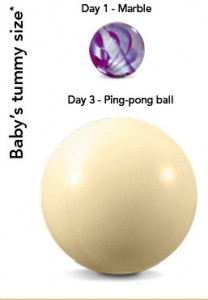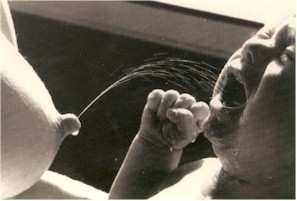 Nearly all babies will spit up after some feedings, whether they are breastfed or bottle-fed. In a healthy baby who is gaining weight well and has good urine output (6-8 wet cloth diapers or 5-6 disposable) and at least 3 bowel movements in 24 hours (in babies over 6 weeks old, stooling less often is normal), then spitting up is more of a laundry problem than a medical problem.
Nearly all babies will spit up after some feedings, whether they are breastfed or bottle-fed. In a healthy baby who is gaining weight well and has good urine output (6-8 wet cloth diapers or 5-6 disposable) and at least 3 bowel movements in 24 hours (in babies over 6 weeks old, stooling less often is normal), then spitting up is more of a laundry problem than a medical problem.
Babies spit up for lots of reasons, including gagging when the milk lets down quickly and forcefully, oversupply of milk, immature muscle control, allergy, and disease. Many times the reason for the spitting up can’t be determined. Most healthy babies will outgrow the spitting up stage within 4-6 months.
If your baby seems happy and is growing normally, try these tips for minimizing spitting up:
- Handle him gently and burp him often.
- Try to keep him in an upright position during and after feedings. Nurse frequently. Smaller, more frequent feedings are easier to digest.
- Keep clean up supplies (a cloth diaper to throw over your shoulder is a necessity) and a change of clothes nearby.
- If you have tons and tons of milk, and your baby chokes or gags when the milk lets down, then spits up afterward, try offering one breast per feeding. You may also try taking him off the breast when the milk first lets down and catching the forceful spray in a towel, then putting him back on the breast after the initial flow of milk has subsided. For more suggestions on handling an overabundant milk supply, see the article Oversupply: Too Much Milk.
- If your baby wants to nurse constantly, and seems to spit up every time he eats, try offering a pacifier -that may keep him from overfilling his stomach and spitting up the excess. If he isn’t gaining weight well and getting him to nurse is a struggle, forget the pacifier. He needs to spend all his sucking time at the breast.
- If you are giving him supplemental vitamins, iron, or fluoride, try discontinuing them. Most breastfed babies don’t need vitamin supplements. If you are taking herbal or vitamin supplements, try stopping and see if it makes a difference. If your baby is receiving supplemental formula or has just started eating a new food, stop offering it. If you are eating a lot of dairy products, or if you have a family history of allergies, try cutting back or eliminating allergenic foods like milk, eggs, or wheat. It takes up to two weeks to completely eliminate milk protein from your milk, so allow that much time before you decide if it has made a difference.
The article Nutrition, Weight Loss, and Excercise has more information about diet and allergies.
Sometimes babies have a number of symptoms in addition to spitting up which may indicate a problem called “gastroesophageal reflux”, also called GER, or just “reflux”. Reflux occurs when the muscle at the opening of the stomach (which keeps milk in the stomach until it is empties into the small intestine) opens up at the wrong times, causing the milk to back up into the esophagus (the tube that leads from the throat to the stomach). The gastric juices are acidic, and can burn and irritate the throat and esophagus.
The newborn’s stomach is small (about the size of a ping pong ball), and has to accommodate a large volume of milk in relation to its size. Most babies who spit up are just messy eaters, and the excess milk they take in comes back up. The spitting up disappears without treatment as they mature.
 There is another condition that can cause symptoms of vomiting in infants, and is more severe than reflux. It is pyloric stenosis, and is seldom seen in breastfed babies. It is most common in male infants, and usually develops 4-6 weeks after birth. The baby often projectile vomits, which means that his stomach muscles force the milk up his throat and it shoots forcefully out of his mouth, sometimes as far as several feet away. As time goes on, he will begin projectile vomiting after every feeding, and will not gain weight well. This condition is usually treated with a simple surgery (called pyloromyotomy). Occasional projectile vomiting doesn’t mean the baby has pyloric stenosis, but if it occurs once a day or more, you should have your baby checked by his doctor.
There is another condition that can cause symptoms of vomiting in infants, and is more severe than reflux. It is pyloric stenosis, and is seldom seen in breastfed babies. It is most common in male infants, and usually develops 4-6 weeks after birth. The baby often projectile vomits, which means that his stomach muscles force the milk up his throat and it shoots forcefully out of his mouth, sometimes as far as several feet away. As time goes on, he will begin projectile vomiting after every feeding, and will not gain weight well. This condition is usually treated with a simple surgery (called pyloromyotomy). Occasional projectile vomiting doesn’t mean the baby has pyloric stenosis, but if it occurs once a day or more, you should have your baby checked by his doctor.
Reflux in adults causes heartburn. Symptoms of reflux in infants may include sudden, inconsolable crying; refusing to nurse, or wanting to nurse ‘constantly’; difficulty swallowing; vomiting hours after eating; frequent sore or irritated throat; breathing difficulties, such as wheezing, bronchitis, labored breathing or apnea; disruption of sleep patterns, or slow weight gain. Many healthy, normal babies will have some of these symptoms without having reflux. Reflux is not usually considered a problem unless the baby is really hurting and miserable, is not gaining weight, has choking episodes, or is experiencing complications from aspirated fluid or inflamed tissue in his esophagus. In most cases, treatment of reflux focuses on helping your baby be more comfortable while his digestive system has time to mature. Many babies with symptoms of reflux show great improvement by the middle of the first year, and outgrow it completely by one year, although sometimes it takes longer.
Research has shown that breast-fed babies have fewer and less severe episodes of reflux than formula-fed babies. Breast milk is more easily digested than formula, and is emptied from the baby’s stomach twice as quickly. The less time the milk spends in the stomach, then the less opportunity it has to back up into the esophagus. Any delay in stomach emptying can aggravate reflux. Because human milk is digested so quickly, more milk can be absorbed in a shorter amount of time, even if it does come back up.
Another advantage of breastfeeding the baby with reflux is that human milk is less irritating to the esophagus than formula, and has a lower acidity, so if the baby does aspirate it, it causes less burning. Breastfed baby’s spit-up also has a much less offensive smell than a formula-fed baby’s, and it is less likely to stain clothing.
Another advantage of nursing the baby with reflux is the ‘comfort factor’. The closeness between the nursing couple is unique. When your baby is in pain or unhappy, it is easy to become overwhelmed and stressed out. Nursing gives you a built in way to comfort your little one, and the hormones produced when you breastfeed help you relax while dealing with a very fussy baby. Nursing helps you respond to your baby’s cues, and while you can’t always eliminate his discomfort or make him happy, it is important for you to be there to comfort him, and nursing (with the closeness and body contact that it involves) is the very best way to do that.
Once the diagnosis of reflux is made – usually based on the mom’s description of her baby’s behavior, but often doctors will give the baby a radioactive isotope in milk and track the passage of the milk – breast milk can be used for this test, and given by dropper or cup if the baby won’t take a bottle and other medical problems such as lung disease, asthma, or pyloric stenosis are ruled out, treatment options vary. Usually the first thing to try is upright positioning during and after feedings. Some baby seats can aggravate reflux because they bend the baby’s middle and put pressure on his stomach. Using a front carrier or baby sling, elevating the crib at a 45 degree or greater angle, or letting him sleep upright on your chest are good alternatives.
The next thing is to try to identify foods or vitamins in the mother or baby’s diet that might be causing a reaction. In the past, it was often recommended that mothers add cereal to thicken their baby’s feedings. The theory was that thicker food would have a harder time bouncing back up into the esophagus. This method has not been shown to be effective, and can interfere with breastfeeding. It can also cause more irritation to the baby’s esophagus if it is aspirated, and is not commonly used today.
If these measures don’t work, the next step is to try medicine to reduce stomach acid and help speed up the time that it takes for the milk to pass into the baby’s intestines. A commonly used medication is Zantac (which reduces stomach acid). Surgery is a last resort, and is reserved for severe cases with dangerous complications, and only after all other treatment has failed.
One common challenge to overcome when dealing with reflux is that since the baby experiences pain when he eats, he may decide he doesn’t want to nurse. This can be terribly frustrating for both you and your baby, and can result in low weight gain. If he needs to be supplemented, you can pump after feedings to get high calorie hindmilk and supplement with that instead of formula. If you don’t want to use bottles, see the article Introducing Bottles and Pacifiers to the Breastfed Baby, for information on alternate feeding methods.
Experiment with the suggestions in this article, because what works for one baby may not work for another. Work closely and communicate with your baby’s health care providers, because treatment of reflux can require adjusting medications and trying different options until you find what works for your baby.
Make sure that you have lots of support and help for you and your family while you are dealing with the stress of an unhappy baby. Ask for help! Let someone bring you meals or take your older kids for a while. A great support group for parents dealing with reflux is PAGER (Pediatric/Adolescent Gastroesophageal Reflux Association). PAGER is a national organization that provides information and support to families who have children with reflux. They have brochures, hold monthly meetings, and publish a monthly newsletter. Their website address is www.reflux.org.
If your baby has reflux, try to keep a positive attitude, and remember that in almost all cases, spitting up and reflux occurs in healthy babies who just need a little more time to grow. Before you know it, your fussy baby will be a teenager and getting his driver’s license, and then you’ll really have something to worry about!
Anne Smith, IBCLC
Breastfeeding Basics
*Please ‘Pay it Forward’!*
If you found any of the information in this article helpful, please consider making a small donation to my favorite cause – Project Pets: Spay, Neuter, Love, an all volunteer, non-profit organization that provides free spay and neuter services for homeless rescue dogs and cats…because every baby deserves a home, whether they have two legs or four! To find out more, visit Project Pets on Facebook.
 Breastfeeding Basics
Breastfeeding Basics





